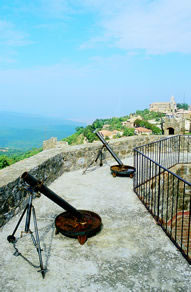 |
 The
Atelier van Lieshout group formed with the intention of going beyond some
of the barriers that have characterized the visual arts. Opposed to the
myth of the inspired creator, the members work as a collective studio which
is close in feeling to the ateliers formed by architects, designers and
painters. Disagreeing with the idea that art should be unique, un-reproducible
and without function, the Atelier has chosen to make a catalogue of reproducible
projects available to its public, all things conceived for home furnishings
as well as for more fantastic uses: from kitchens to bedrooms, from single
habitation units to an entire "ideal" city where food, sex, war
and everything else that is part of human life can be included. Atelier
van Lieshout replies to the utopianism of the early twentieth century with
a radical and provocatory realism that is embued with a rather bitter sense
of humor. However, the idea that lies behind their work is always to defy
old and new conventions which tend to separate the world of art from the
realm of daily life. The
Atelier van Lieshout group formed with the intention of going beyond some
of the barriers that have characterized the visual arts. Opposed to the
myth of the inspired creator, the members work as a collective studio which
is close in feeling to the ateliers formed by architects, designers and
painters. Disagreeing with the idea that art should be unique, un-reproducible
and without function, the Atelier has chosen to make a catalogue of reproducible
projects available to its public, all things conceived for home furnishings
as well as for more fantastic uses: from kitchens to bedrooms, from single
habitation units to an entire "ideal" city where food, sex, war
and everything else that is part of human life can be included. Atelier
van Lieshout replies to the utopianism of the early twentieth century with
a radical and provocatory realism that is embued with a rather bitter sense
of humor. However, the idea that lies behind their work is always to defy
old and new conventions which tend to separate the world of art from the
realm of daily life.
Atelier van Lieshout worked at the Fortress in Montalcino, commenting on
its military vocation with sculptures whose recent materials (plastic fibers,
fiberglass and steel) deliberately contrast with the fort’s ancient
stones. Outside the visitor is greeted by a truck containing an arsenal,
conceived as a kind of mobile weapons factory: the inside of the truck has
been designed for living, with a bed and kitchen area, as if to suggest
that the inhabitant should never move away from his production or his personal
obsession. Not far off a Mercedes has been modified to hold a canon, a curious
hybrid between status symbols of both civilian and military life. Indoors
a managerial meeting room has been set up where there are stylized figures
of men, made of plastic, lying on the floor. On the towers and along the
guard-walks fake cannons have been arranged here and there. For their materials
and forms all these works have the inoffensive appearance of toys but their
dimensions make them menacing. They inhabit a borderline between irony and
testimony of a very crude kind: war is not relegated to our past. It has
abandoned certain places like the Montalcino Fortress - which has now become
a destination for food lovers especially - but it has taken over others
and will never cease to exist. Aggressive behavior is innate in the man-animal
and has always been expressed in his childhood games. It has not diminished
in history but rather, today, it uses synthetic materials, serially-made
industrial weaponry, with ever more sophisticated means of channeling primitive
energies. Although the work’s intentions are more playful than moral,
it points out that not being aware of this situation would be absurd and
blameful. |
|

